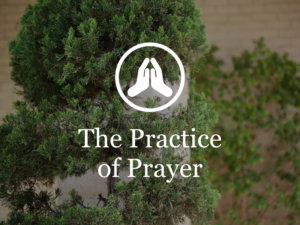If you were to ask the average Christian what is most essential for a healthy prayer life, you would likely hear helpful answers such as an environment without distractions, discipline and determination, eager faith and expectancy, or humility and boldness. Indeed, each of these are critical to our life of prayer.
Jesus himself “would often slip away to the wilderness to pray” (Luke 5:16). He instilled in his disciples the need to “pray and not lose heart,” just like the determined widow before her judge (Luke 18:1–8). James instructs Christians to offer requests to God “in faith, without doubting, for the one who doubts is like the surf of the sea, driven and tossed by the wind” (James 1:6). And the writer of Hebrews reminds us to take advantage of our privilege as children of the King and “draw near with confidence to the throne of grace, so that we may receive mercy and find grace to help in the time of need” (Heb. 4:16).
Listening Influences Our Prayers
But the most essential aspect of prayer is actually not the environment, attitude, or manner of our speaking to God. What contributes most to the health of our praying comes before we ever utter a word to the Almighty. It is our hearing—our listening to the words of God on the pages of Scripture—that influences our praying most.
In order to emphasize the primacy of God in all things, theologians refer to God as the foundation for existence (principium essendi ), the foundation for knowing (principium cognoscendi), and, most importantly for prayer, the foundation for speaking (principium loquendi ). While theologians typically refer to this third principle to emphasize that man could not speak about God if God had not first spoken to us, this principle also relates to prayer:
If God had not first spoken to us, we could not speak to him
Man’s speaking to God is directly dependent on God’s Word to man. Without God’s propositional revelation, prayer in any meaningful sense would be impossible.
Study Well to Pray Well
As such, to be a man or woman of prayer necessitates being a man or woman of the Word—it means submitting oneself to the absolute authority of Scripture in whatever it says. It means approaching Scripture as “the oracles of God” (Rom. 3:2)—oracles that cannot be altered, contested, ignored, or disobeyed. Thus, if you are to pray well dear Christian, you must be committed to studying well. True prayer—just like true preaching—cannot be practiced or experienced without this foundational commitment.
Illustrations Throughout the Bible
When Moses interceded for Israel after she refused to enter the Promised Land, he prayed using God’s previous revelation as his starting point:
But now, I pray, let the power of the Lord be great, just as You have declared, “The LORD is slow to anger and abundant in lovingkindness, forgiving iniquity and transgression; but He will by no means clear the guilty, visiting the iniquity of the fathers on the children to the third and the fourth generations.” Pardon, I pray, the iniquity of this people according to the greatness of Your lovingkindness, just as You also have forgiven this people, from Egypt even until now. (Num. 14:17–19, citing God’s previous words given in Ex. 34:6–7)
Study Prayer with Dr. Brad Klassen
This course is designed to impact the personal prayer life of students through a detailed study of Old and New Testament prayers and the scriptural teaching on prayer.
When Daniel petitioned God on behalf of exiled Israel, he, too, did so with previous revelation in mind:
In the first year of Darius the son of Ahasuerus . . . I, Daniel, observed in the books the number of the years which was revealed as the word of the LORD to Jeremiah the prophet for the completion of the desolations of Jerusalem, namely, seventy years. So I gave my attention to the Lord God to seek Him by prayer and supplications, with fasting, sackcloth and ashes. (Dan 9:1–3, citing the prophecy of the “70 years” given in Jer. 25:11–12 and 29:10)
The early church, in response to the protection God provided to Peter and John from the threats of the Jewish Sanhedrin, responded in prayer filled with the words of the Old Testament:
And when they heard this, they lifted their voices to God with one accord and said, “O Lord, it is You who MADE THE HEAVEN AND THE EARTH AND THE SEA, AND ALL THAT IS IN THEM, who by the Holy Spirit, through the mouth of our father David Your servant, said, 'WHY DID THE GENTILES RAGE, AND THE PEOPLES DEVISE FUTILE THINGS? THE KINGS OF THE EARTH TOOK THEIR STAND, AND THE RULERS WERE GATHERED TOGETHER AGAINST THE LORD AND AGAINST HIS CHRIST...'" (Acts 4:24–26, citing Ex. 20:11 and Ps. 2:1–2)
Conversely, Solomon stated that there is no way to be both ambivalent to God’s Word and “spiritual” at the same time: “He who turns away his ear from listening to the law, even his prayer is an abomination” (Prov. 28:9; see also Ps. 66:18).
The Starting Place for Your Life of Prayer
A statement from George Müller helps illustrate the priority that God’s Word is to have in our prayer. Recognizing that he had put the cart before the horse, Müller writes:
Before this time my practice had been, at least for ten years previously, as an habitual thing, to give myself to prayer, after having dressed in the morning. Now I saw, that the most important thing I had to do was to give myself to the reading of the Word of God and to meditation on it, that thus my heart might be comforted, encouraged, warned, reproved, instructed; and that thus, whilst meditating, my heart might be brought into experimental communion with the Lord. I began, therefore, to meditate on the New Testament, from the beginning, early in the morning. (A Narrative of Some of the Lord’s Dealings with George Müller, vol. 1)
Hearing the Word of God as delivered in Scripture is the starting place for your life of prayer—whether you are a new disciple of Jesus Christ or a seasoned prayer warrior. If you find yourself struggling in prayer, it can ultimately be traced to your struggle in the study and understanding of Scripture. A right approach to Scripture will not only motivate and enable you to pray better, but it will instruct you how to pray and provide you with the right content to pray:
For undoubtedly, that which God abundantly makes the subject of His promises, God’s people should make the subject of their prayers. It also affords them the strongest assurances that their prayers shall be successful. (The Works of Jonathan Edwards)
We tell our children often, “Listen before you speak.” The same holds true for our praying.
To learn more about reading and understanding Scripture, see our resource: Handling Scripture.








